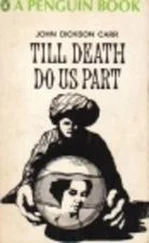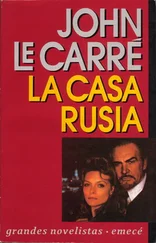And even the brief-case could not stop that crazy flight.
For Miles found the brief-case lying discarded on the floor of the passage, dimly seen in the light of the opening and shutting teeth. Fay must have run straight across it; she could not even have noticed it. Miles shouted to her as she gained the top of the steep stairs leading down to the ground floor. He snatched up the brief-case holding it upside down as though to gain her ye by pantomime. From inside the gaping leather there fell out three packets of bank-notes like the other in the bedroom. These landed on the floor, along with a pouring of some dry gritty substance like mortar-dust. There was nothing else in the brief-case.
Miles flung himself at the head of the stairs.
“It's here, I tell you! It's not gone! It's been dropped ! It's here!”
Did she hear him? He could not be sure. But, at least briefly, she paused and looked up.
Fay was about half-way down the stairs, steep stairs covered with ragged linoleum. Th front door of the house stood wide open, so that light from the window across the street filtered weirdly up the staircase.
Miles, leaning perilously over the balustrade along the passage and holding up the brief-case, was looking down into her face as she raised it.
“Don't you understand? He shouted. “There's no need to run like that! Here is the brief-case! It's . . .”
Now he could have sworn she hadn't heard. Fay's left hand rested lightly on the stair-rail. Her neck was arched, the red hair thrown back as she looked up. On her face was a faintly wondering look. Her heightened colours, even the glitter of her eyes, seemed to fade into a deathly bluish pallor which put a gentle expression on her mouth and then took away all expression at all.
Fay's legs gave way at the knees. Softly, like a dress falling from a hook, so bonelessly that it could not even have caused a bruise, she fell sideways and rolled over and over to the floor of the stairs. Yet the crash of the fall, in contrast to that terrifying limpness . . .
Miles Hammond stood still.
The stifling, mildewy air of the passage had got into his lungs like the sudden suspicion in his mind. He seemed to have been breathing that air for a very long time, with the blood-stained banknotes in his pockets and the cracked brief-case in his hand.
Out of the corner of his eye Miles saw Barbara come up beside him and look down over the railing. Superintendent Hadley, muttering something under his breath, bounded past them and went downstairs with long strides which shook and thumped on every tread. He jumped over the figure lying at the foot of the stairs with its cheek against the dirt of the floor. Hadley went down on one knee to examine that figure. Presently he raised his head to look up at them. His voice sounded hollowly up the stairs.
“Wasn't this woman supposed to have a weak heart?”
“Yes,” said Miles calmly. “Yes. That's right.”
“We'd better ring for an ambulance,” the hollow voice replied. “But she shouldn't have got worked up and run like that. I think it's finished her.
Miles walked slowly downstairs.
His left hand rested on the balustrade where Fay's hand had rested. He dropped the brief-case as he walked. Across the street, seen now through an open front door, the ugly bodiless teeth very slowly opened and closed, opened and closed throughout all eternity, as he bent over Fay's body.
Chapter XVIII
It was half-past six o'clock on that same Sunday evening, though it might have been days later as regards the apparent passage of time, when Miles and Barbara sat in Fay Seton's bedroom up on the first floor.
The electric light was burning again over the chest-of-drawers. Barbara sat in the frayed armchair. Miles sat on the edge of the bed, beside Fay's black beret. He was looking at the battered tin box when Barbara spoke.
“Shall we go out an see if there's a Lyons or an A.B.C. Open on Sunday? Or a pub where they might have a sandwich?”
“No. Hadley told us to stay here.”
“How long has it been since you last had anything to eat?”
“One of the greatest gifts with which a woman can be endowed”--Miles tried to manage a smile, though he felt the smile stretch like a sick leer--”is the gift of not mentioning the subject of food at inconvenient times.”
“Sorry,” said Barbara, an was silent for a long time. “Fay may recover you know.”
“Yes. She may recover.”
And then the silence went on for a very long time, while Barbara plucked at the edges of the chair-arms.
“Does this mean so very much to you, Miles?”
“That isn't the main point at all. I simply felt that this woman has been given the worst possible raw deal from life. That things ought to be put right somehow! That justice ought to be done! That . . .”
He picked up Fay's black beret from the bed, and hastily put it down again.
“Anyway,” he added, “what's the use?”
“In the short time you've known her,” said Barbara, evidently after another struggle to keep silent, “did Fay Seton become as real as Agnes Sorel or Pamela Hoyt?”
“I beg you pardon? What's that?”
“At Beltring's,” answered Barbara without looking at him, “you said a historian's work was to take distant people, dead and gone people, and bring them to life by thinking of them as real people. When you first heard Fay's story, you said she was no more real than Agnes Sorel or Pamela Hoyt.”
In an inconsequential way, still plucking at the edges of the char-arm, Barbara added:
“Agnes Sorel I'd heard of, of course. But I never heard of Pamela Hoyt. I—I looked her up in the encyclopaedia, but sh wasn't there.”
“Pamela Hoyt was a Regency beauty suspected of evil courses. A captivating character, too; I read quite a lot about her at one time. By the way: in Latin, what does panes mean beside the plural of bread? It couldn't have meant bread, from the context.”
It was Barbara's turn to blink at him in surprise.
“I'm afraid I'm not enough of a Latinist to know. Why do you ask?”
“Well, I had a dream.”
“A dream?”
“Yes.” Miles pondered this in the heavy, dully insistent way with which the mind will seize on trifles at a time of emotional disturbance. “It was a passage in mediaeval Latin; you know the sort of thing: peculiar verb-endings and u 's instead of v 's.” He shook his head. “All about something and panes; but all I can remember now is the ut- clause at the end, that it would be most foolish to deny something.”
“I still don't understand.”
(Why wouldn't that infernally sickish feeling leave his chest?)
“Well, I dreamed I went into the library looking for a Latin dictionary. Pamela Hoyt and Fay Seton were both there, sitting on dusty mounds of books and assuring me my uncle hadn't got a Latin dictionary.” Miles started to laugh. “Funny thing, too; just remembered it. I don't know what Dr. Freud would have made of that one.”
“I do,” said Barbara.
“Something sinister, I imagine. It would appear to be something sinister no matter what you dream.”
“No,” said Barbara slowly. “Nothing like that.”
For some time she had been regarding Miles in the same hesitant, baffled, helpless way, the luminous whites of her eyes shining in sympathy. Then Barbara sprang to her feet. Both windows had been opened to the drizzling afternoon, admitting clean damp air. At least, Miles reflected, they had shut off the advertising lights and that dental horror across the street. Barbara turned at the window.
“Poor woman!” Barbara sad, and he knew she was not referring to a dead Pamela Hoyt. “Poor, silly, romantic . . .!”
“Why do you call Fay silly and romantic?”
Читать дальше










